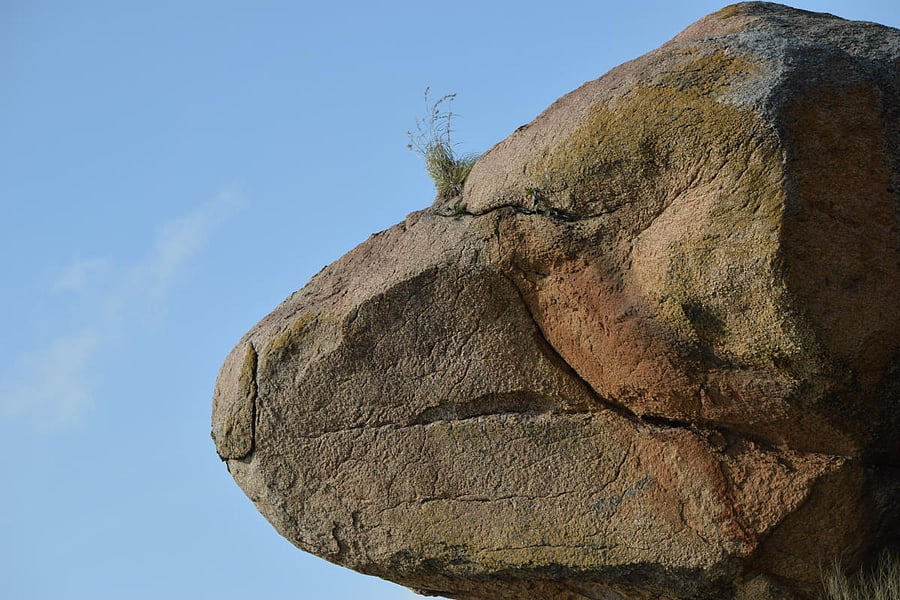
The Pandava brothers and their mother Konthamma spent time in Ekachakrapura with no food to eat, or clothes to wear.
One day, during a heavy downpour, Konthamma went from house to house offering to pound paddy. She stopped before the house of a Brahmin, called Kankana Bhatta, happy to note the preparations for a wedding. All the kin had assembled there. There was plenty of pomp and excitement.
A demon called Bakasura, living on the hill outside town, was making the lives of people miserable. According to the agreement the town folks had made with Bakasura, each day, the house assigned had to send him a cart loaded with 12 pallas of rice and other eatables, along with a member of the household. The house assigned for that day was Kankana Bhatta’s.
‘Ayyo Siva! Who do I send now? I can’t send my son who is getting married. Who will conduct the marriage if I go? No one else will go even if offered money,’ wailed the Brahmin, sitting in the house decked up for the wedding. All the guests were wailing too. Konthamma heard them and wanted to know why they were wailing on an auspicious day. Her belly burned to hear their woeful story.
‘Don’t cry, Subbamma’ she said to Bhatta’s wife, ‘I have five sons, one of whom I am finding hard to feed. I will send him to the demon. I want no wages for this act of charity. Just feed my son as much as he wants.’
Konthamma came straight back to Gundaiah’s house and told Dharmaraya about her promise. Dharmaraya controlled his grief in an effort to not hurt his mother.
‘Which of your sons do you want to send, mother?’
‘We’ll have to send Bhima.’
‘Suppose the demon turns out to be stronger, what will happen to Bhima?’ queried Dharma anxiously.
‘No demon can defeat Bhima. He is sure to come back triumphant!’ said Arjuna. When Bhima learnt about the food the demon was being offered, he cried, ‘It’s been so long since I had a hearty meal. Tell them I’ll do it, mother’ and went to the Brahmin’s house with her.
Subbamma wondered how any mother could offer such a wrestler-like son to the demon. The Brahmins served Bhima loads of food with a loving heart. He consumed it all the moment it was served.
At a signal from Muddegowda, Bhimanna set off driving the cart, filled with 12 pallas of rice and other accompaniments. He devoured all the food and drained pots of milk, curds and ghee. His tummy wasn’t full even after all this eating and drinking.
Furious at the sight, Bakasura flung boulders at him from the top of the hill. But they fell like tiny hail stones on Bhima, who blew them away as though they were balls of puffed rice.
‘Wicked demon, I’ll pluck your feathers and crush your pride,’ retorted Bhimanna. Roaring like a lion, the demon descended on him and gave him three hard blows on his back. Bellowing like a beast, Bhimanna hit the demon and kicked him so hard that the demon landed on the hilltop squealing. Taking him by the legs, Bhimanna spun him thrice and flung him into the sky. Filling the sky with his foul cry, Bakasura landed with a thud at the entrance to Ekachakrapura.
After feeding and watering the bullocks, Bhimanna tied them to a pillar and went into the wrestling house to sleep.
Opening the village door the following morning, the guards found Bakasura lying outside, and ran back screaming. Panchayat members ventured out to take a look. When they saw crows and vultures flying over him, they knew Bakasura was dead. The villagers hailed and cheered Bhima. Patela garlanded him and took him around in a procession.
‘This blessed man has killed the demon and saved our village. Let him be the village chief,’ he said to Dharma. Dharma then told him: ‘We haven’t come here to be crowned. The good name we have earned here is honour enough for us. If you insist on rewarding us, name your village Pandavapura, in memory of the Pandavas, who, you say, were burnt in the house of lac. Let this immortalise their good name.’
And that’s how Pandavapura got its name.
The author, a retired professor of English, is a well-known theatre and television artiste and an award-winning translator.
Folktales from the Mahabharata is a monthly column that features lesser-known episodes from ‘Janapada Mahabharata’ sung by eminent folk-artiste Bettada Beedu Siddhashetty and published by Dr P K Rajashekara.